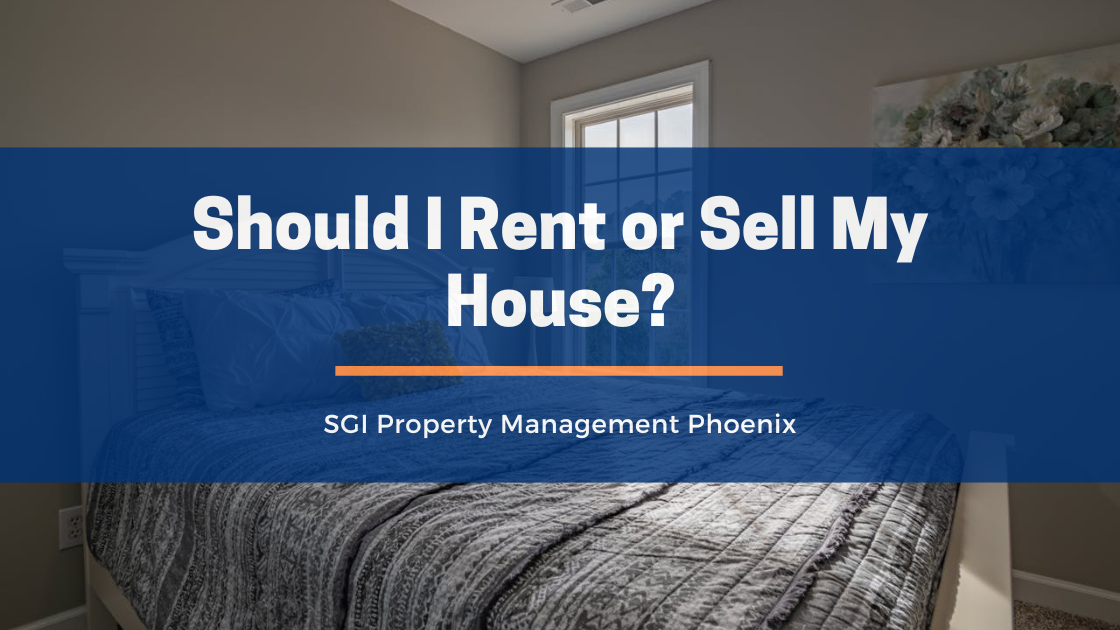
Are you a landlord wondering if now is the time to rent or sell your house? This decision can feel overwhelming, but understanding the benefits and challenges of both options can make it easier.
Renting offers steady income and potential for property value growth, while selling could give you an immediate financial boost. The right choice depends on your financial situation, market conditions, and future plans.
In this guide, SGI Property Management Phoenix will walk you through the key factors to consider, helping you make the best decision for your property and long-term goals.
Deciding Between Renting and Selling: What’s Common?
Many homeowners face this important decision for a variety of reasons, such as:
You’ve completely paid off your mortgage.
Your property has been recently renovated.
You’re relocating but want to retain your current property as an investment.
You might return to the area in the future.
You want to generate passive income for financial security.
You’re adjusting to new lifestyle changes.
You’re influenced by current market trends.
Choosing whether to rent or sell is not an easy decision, especially if you have little experience managing a property. It’s important to grasp the full scope of what each choice entails before moving forward.
Reviewing Your Financial Position
Your financial situation plays a key role in deciding whether to rent or sell. Before making any decisions, make sure you consider the following points:

Comparing Mortgage Payments and Rental Income
One of the first steps in your decision-making process should be comparing your mortgage payments to potential rental income. Calculate your monthly mortgage payments, including interest, property taxes, and insurance. Then, research local rental rates to determine how much rent you can reasonably charge.
Ensure that your rental income will cover all expenses, leaving you with a comfortable profit. Also, consider extra costs like maintenance, property management fees, and possible vacancy periods. This analysis will give you a clear picture of whether renting is financially feasible.
How Property Taxes Impact Profitability
Property taxes are a significant expense when renting out a property. Taxes are based on your home’s value, which can vary depending on your location. If you decide to rent, you will still be responsible for these taxes, which can affect your profitability.
Additionally, your property taxes may change if the house is no longer your primary residence. Carefully assess whether your rental income will sufficiently cover all these costs, ensuring that you maintain a positive cash flow.
Understanding Capital Gains Tax for Home Sales
If you decide to sell, capital gains taxes may apply. These taxes are based on the profit you earn from selling your home. However, there are exceptions. For example, if you have lived in your home for at least two of the past five years, you may qualify for a tax exemption.

For married couples filing jointly, up to $500,000 of profit can be excluded from taxation, while singles can exclude up to $250,000. Knowing how these taxes apply to your situation is essential when deciding to sell. Consulting with a tax professional is a good idea to fully understand the tax implications.
Considering Your Broader Financial Responsibilities
It’s important to take into account other financial responsibilities when deciding to rent or sell. For instance, do you have enough savings to cover unexpected expenses, such as repairs or tenant issues?
If you have large financial commitments, like student loans or a new home purchase, selling your property might make more sense.
Conversely, if your financial situation is stable and you’re looking for a long-term investment, renting out your home could be a smart move. Generating passive income from a rental property can help you build wealth over time.
Weighing the Costs: Renting vs. Selling
When deciding to rent or sell, it’s essential to understand the specific costs associated with each option.
Costs of Renting
Renting your property comes with a variety of expenses, including:
Property management fees (typically 5-10% of the monthly rent)
Regular maintenance and repairs
Property taxes
Insurance for rental properties
Homeowners’ association fees
Costs of vacancy and tenant turnover
Marketing your property to prospective tenants
Costs of Selling Your Home
Selling your home also comes with its own set of costs, such as:
Real estate agent commissions
Closing costs

Repairs to make the property market-ready
Staging and preparing the home for showings
Marketing expenses
Bottom Line
Deciding whether to rent or sell your house is a big decision, and there’s no one-size-fits-all answer. It depends on your financial goals, market conditions, and personal plans.
Whether you’re looking for steady rental income or considering cashing out on your investment, it’s important to carefully weigh your options. If you decide to rent but don’t want the hassle of managing the property yourself, SGI Property Management Phoenix can help.
From finding quality tenants to handling maintenance and more, we’ll make your rental experience stress-free and profitable. Contact SGI Property Management today to maximize your property's potential!









